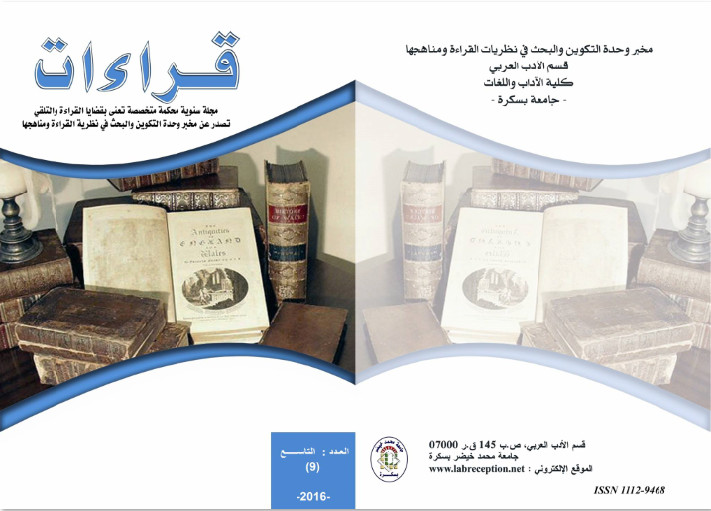البلاغة والنقد الأدبي:الوظائف والمساحات المشتركة دراسة تاريخ النظم وتطوره
Résumé
بالرغم من التقاء البلاغة والنقد في مساحة عمل واحدة هي النص الأدبي، إلا ان بينهما فروقا ما بين العلم والفن، فالبلاغة علم يقوم على قواعد وحدود وتقسيم وتحكم مقولاتها قيود منطقية ، والنقد فن يقوم على التحليل والحكم والتعليق والتقويم وتحكم عملياته حرية إبداعية،لكن هذه الفروق لا تمنع من تداخلهما وتجاورهما ما داما يلتقيان في منطقة النص الأدبي فتحضر مقولات بلاغية في النقد وتُؤدى عمليات نقدية في البلاغة، مما يفرز فنا نقديا بطعم علم بلاغي، وعلما بلاغيا بذوق فن نقدي،ويعتبر النظم من أهم المساحات المشتركة بين النقد والبلاغة لاضطلاعهما بدراسة تاريخه وتطوره الاصطلاحي باعتباره وليجة للكشف عن أسرار إعجاز النص القراني.
و سنحاول في هذه الورقة البحثية بيان الدور التاريخي للبلاغة والنقد في دراسة تاريخ النظم العربي وتطوره للكشف عن أسرار اعجاز النص القرآني بالتركيز على عبد القاهر الجرجاني الذي شكل حلقة وصل بين البلاغيين النقاد وعلماء الاعجاز بنظريته في النظم.
Abstract
Despite the confluence of rhetoric and criticism in one workspace, which is the literary text, there exist differences between them as the differences between science and art; rhetoric is a science of rules and boundaries and its statements are ruled by logical restrictions; however, criticism is an art that is based on analysis, judgment, comment, and evaluation and its processes are governed by a creative freedom. Yet, these differences do not hinder their overlapping as long as they converge in the area of the literary text. So, some rhetorical statements might occur and lead to critical processes in rhetoric, which produces a critical art with a rhetorical taste and a rhetoric with a taste of a critical art. Versing (Nazm) is considered as one of the most common spaces between criticism and rhetoric as they investigate its history and evolution of its concept for it reveals the miracles of the Quranic text. We also attempt in this paper to show the historical role of the rhetoric and criticism in the study of the Arabic prose’ history and evolution to uncover the secrets of the Quranic inimitability by focusing on Abdulkaher El Jurjani, who linked between critics rhetoric and the inimitability scholars in his theory of versing (Nazm)


